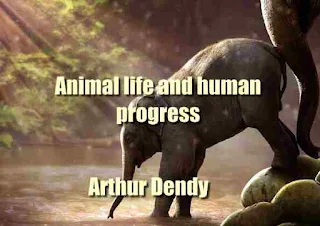Download Animal life and human progress -PDF by Arthur Dendy
Animal life and human progress
 |
| Animal life and human progress |
This volume is the outcome of a course of nine public lectures delivered at King's College, London, in the Spring term of the Session 1917-18, under the auspices of the Imperial Studies Committee of the University of London.
It was felt to be very desirable at this time to bring before the public in as convincing a manner as possible the claims of Zoological Science to recognition in terms of equality with other departments of learning. It would perhaps be better to urge such claims on behalf of the Science of Biology as a whole, for the distinction between zoological and botanical studies is a very arbitrary one, justifiable only as a matter of convenience and hardly comparable with the distinction between the sister sciences of Chemistry and Physics, though I imagine that the latter also breaks down when investigations are pushed beyond certain more or less well-recognised limits.
There is, moreover, a strong tendency at the present day to insist upon the obvious fact that most, if not all, of those activities of living organisms that are open to scientific investigation, are capable of analysis into what may be termed chemical and physical factors, and this insistence, often pushed to unreasonable extremes, has undoubtedly tended to depreciate the independent value of the biological sciences in many minds.
In an ideal educational atmosphere, it would be regarded S as quite unnecessary, if not actually derogatory, to base the claims of any department of learning mainly, or even largely, upon utilitarian considerations. Knowledge for its own sake is a fine watchword, but those who control the national purse- strings and have to justify their expenditure in the eyes of an exacting and not very far-seeing public, not unnaturally like to be able to show some return which the public is capable of appreciating. The utilitarian aspect of our subject cannot, therefore, be altogether ignored — and indeed it is only right that the vast material resources of the animal kingdom should be fully exploited in the interests of mankind.
At the same time it is no less necessary that the eyes of the public should be opened to the value of biological studies from a purely academic and educational point of view, and if our national system of education is to rest upon a broad and firm basis we must insist upon the paramount importance of these subjects — the investigation of which alone renders possible the scientific study of man himself in all his manifold relations.
In arranging the present course it was necessary to secure, as far as possible, an adequate treatment of the subject matter from various points of view, and our lecturers were chosen, not merely on account of their academic distinction, but because each one of them might be expected to have something of first-rate importance to say upon some particular aspect of Zoological Science.
The subjects of the different lectures have, therefore, not been selected merely at random, but there is a connection between them all which will be obvious at once to the thoughtful reader. It may at least be claimed for the lectures that they represent the latest views upon matters with which they deal.
If these views appear in some cases to be subversive of modern biological doctrine it must be remembered tliat biological thought is progressive; were it otherwise the claims of biological science to a foremost place in our educational system might well be considered questionable.
The doctrine of Organic Evolution, for example, looms large in several of the lectures, and a certain advance is to be observed from the position held by Charles Darwin and his immediate followers. The foundations of this doctrine, however, remain unshaken, and it is only the superstructure which has been, perhaps too hastily, erected upon them that is being more or less reconstructed in accordance with recent investigations.
The unexpectedly large audiences which were attracted to the lectures, and the great interest evinced in them at the time of delivery, seem to justify the hope that in their present form they may appeal to an even larger circle.
Contents:
Man's account with the lower animals, by A. Dendy.--Some educational and moral aspects of zoology, by G. C. Bourne.--Museums and research, by C. T. Regan.--Man and the web of life, by J. A. Thomson.--The origin of man, by F. W. Jones.--Some inhabitants of man and their migrations, by R. T. Leiper.--The future of the science of breeding, by R. C. Punnett.--Our food from the sea, by W. A. Herdman.--Tsetse-flies and colonisation, by R. Newstead.--Index
Download Animal life and human progress - 5.2 MB









